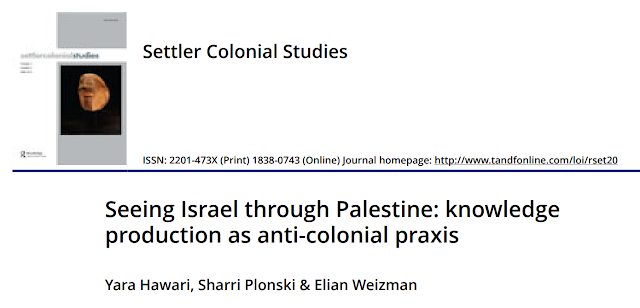
This academic journal article, in Settler Colonial Studies, was just published last week.
Here’s the abstract in academic gobbledygook:
Seeing Israel through Palestine: knowledge production as anti-colonial praxis
Yara Hawari, Sharri Plonski & Elian Weizman
Published online: 31 Oct 2018
ABSTRACT
Knowledge production in, for and by settler colonial states hinges on both productive and repressive practices that work together to render their history and present ‘normal’ by controlling how, where, to and through whom they tell their story. This makes the production and dissemination of knowledge an important battleground for anti-colonial struggles. The State of Israel, in its ongoing search for patrons and partners, is focused on how to produce and appropriate ‘knowledge’, and the arenas in which it is developed and shared. In so doing, it works to reshape critique of its political, social and economic relations and redefine the moral parameters that inform its legitimacy and entrench its irrefutability. Inspired by existing literature on and examples of anti-colonial struggles, this paper challenges the modalities through which Israel produces and normalises the colonial narrative. By critiquing existing representations of the Israeli state – and the spaces and structures in which these take hold – our article contributes to the range of scholarship working to radically recalibrate knowledge of ‘Israel’ and ‘Palestine’. As part of this work, the article purposefully centres indigenous anti-colonial frameworks that reconnect intellectual analysis of settler colonial relations, with political engagements in the praxis of liberation and decolonisation.
The paper takes it as a given that Israel must be destroyed (“liberation and decolonisation”) and wants to ensure that no one looks at it as anything other than an evil, artificial colonialist entry.
The paper starts off with a quote from Benjamin Netanyahu at the UN that it regards as the perfect example of how Israel is trying to fool the world into thinking that it is a liberal, normal state:
Ladies and gentlemen, we live in a world steeped in tyranny and terror where gays are hanged from cranes in Tehran, political prisoners are executed in Gaza, young girls are abducted en masse in Nigeria, and hundreds of thousands are butchered in Syria, Libya and Iraq, yet nearly half – nearly half of the UN Human Rights Council’s resolutions focusing on a single country have been directed against Israel, the one true democracy in the Middle East; Israel, where issues are openly debated in a boisterous parliament, where human rights are protected – by independent courts, and where women, gays and minorities live in a genuinely free society.
The paper doesn’t even attempt to refute Netanyahu’s words. In the circles that these academics travel, facts aren’t important. It is so axiomatic that Israel is inherently, uniquely evil that Netanyahu’s words do not evoke the desire to argue with it as much as the desire to show that they prove that Israel is so bad that its prime minister is forced to divert the world’s attention from its evil.
As with “pinkwashing” – the absurd concept that is roundly rejected everywhere outside the anti-Israel and academic worlds – anything that Israel does that is consistent with liberal values is really immoral, they just have to figure out how.
The article is also concerned that the field of “Israel Studies” helps to make Israel sound like a normal state. The authors are very concerned that academia itself cannot be objective in describing how evil Israel’s colonialism is:
Given our discussion above of counter-hegemony – and the fact that hegemony is a field of struggle – can we then consider all spaces as potential sites for contestation? What tools do we have to turn the study of Israel into a platform for transforming settler colonial relations, when we are working from within one of the key centres of colonial hegemony, the academic arena? Again, this involves challenging how we work, whose voices are centred, and the connection we make between scholarship and praxis, between understanding settler colonialism and resisting it.
The point of these academics isn’t to understand Israel – but to resist it.
The strategyof fomenting Indigenous studies as a starting point for studying the Israeli state and society (as part of critical Palestine Studies), is also a political endeavour.
Throughout this article, we have been working towards a re-reading of Israeli state and society as part of critical Palestine studies; an epistemological starting point that would make visible and disrupt the hegemony increasingly held by Israel Studies in its reproduction of Israel as a ‘normal – if complex – modern state’, as posited in the quote that introduced this article. We have drawn on Indigenous studies and anti-colonial scholarship to make the point that the only way to do this, is to ensure that when we investigate the Israeli state and society, it is with the goal of its transformation. This is informed by a political commitment, requiring not simply that Israel is understood, but that scholars are in solidarity with its decolonisation.
If you are a scholar of Israel and not actively working to dismantle it, then you have no legitimacy in today’s academic environment.
This paper freely admits that when the topic is Israel, academia is part of the “resistance” – meaning exactly what Hamas means when they use the term. There isn’t even the pretext of objectivity or scholarship where Israel is concerned.
We have lots of ideas, but we need more resources to be even more effective. Please donate today to help get the message out and to help defend Israel.

Leave a Reply